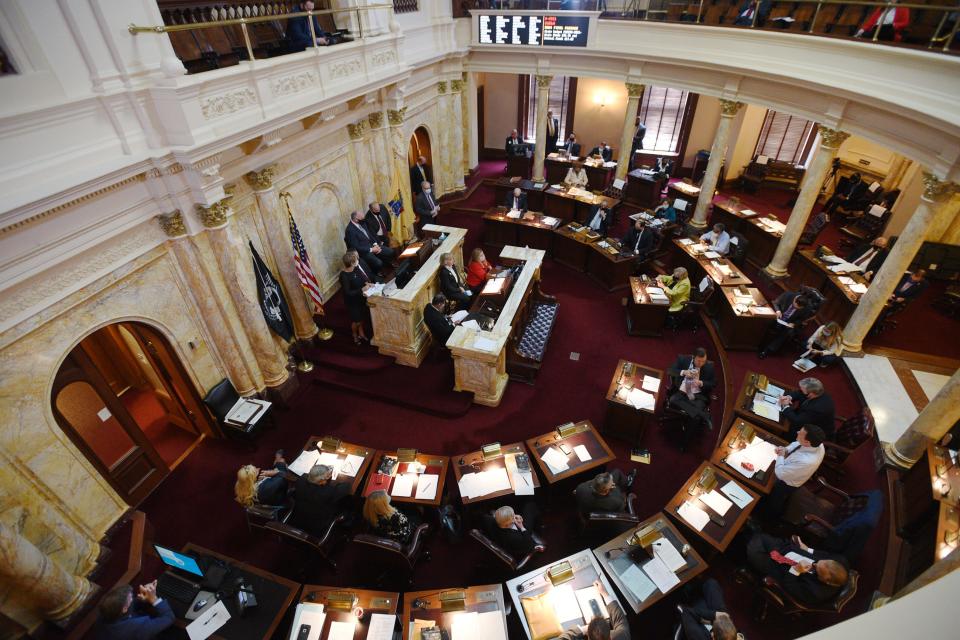Gas tax hike — which would fund transit infrastructure — moves forward in NJ Senate
- Oops!Something went wrong.Please try again later.
- Oops!Something went wrong.Please try again later.
The state Senate budget committee on Monday approved a bill to renew the state Transportation Trust Fund, but that followed a heated exchange Chairman Paul Sarlo had with Republican members of the committee and requests for more discussion from some members of his own party.
This bill passed along party lines — as did the Assembly committee version last week — and is now being fast-tracked for full approval before both chambers, a process Republicans say has been rushed, especially since the bill language was made available less than a week ago.
Sarlo said he had hoped to have bipartisan support on this bill, which would raise the gas tax about 2 cents a year to help pay for the pot of money used to support state transportation projects and would also create a new registration fee for zero-emission vehicles.

“I agree with Senator Sarlo this should be bipartisan, but the way this was formed was not done in a bipartisan manner whatsoever,” said state Sen. Michael Testa, R-Cape May. “This was thrust upon us with less than a week for us to review it. And I just think that this should be done in accordance with the actual budget during the budget season — not now, when we really don’t know what the budget is going to fully look like in June.”
Republicans introduce their own plans for Transportation Trust Fund
State Sen. Declan O’Scanlon, R-Monmouth, said Republicans sought to be part of the Transportation Trust Fund discussion for months but were ignored.
Republicans introduced their own bills Monday to renew the fund. The GOP proposal would not increase the gas tax and instead relies on keeping the bonding capacity to $12 billion, less than the $15 billion proposed in the Democrats’ bill, but says that could be revisited in 2028.
The minority party would direct money from the sales tax on electric vehicles and a new registration fee on those vehicles to the Transportation Trust Fund. The GOP also would require a forensic audit of NJ Transit to find ways to “streamline” the agency and prevent the fund from being “abused to fund agencies that require significant change.”
Sarlo responded to Testa and O’Scanlon: “I’m not going to listen all day to you guys telling me everything is thrust upon you. I don’t know what all the Republican members of my Republican side do all week.”
He added: “This is a very simple bill, six or seven provisions. I’m not sure how long you need to read it to fully understand what it does.”
Last week: Gas tax will rise again if NJ Legislature gets its wish to extend an expiring fund
Advocates express support — and, in some cases, concerns
The testimony that followed for the next hour included feedback from various industry groups in which some gave full support of the bill and others offered a great deal of nuance, questions and requests to revise the bill before their organizations could support it.
Laura Gunn, who represents the Chamber of Commerce of South Jersey, said 80% of the chamber’s members do not support increasing the gas tax, even though the chamber supports infrastructure funding.
“Respondents noted that they do not see a return on investment in the amount of money they currently pay in the gas tax by way of new projects and upgraded transportation infrastructure in South Jersey,” Gunn said, noting that members also didn’t think the fee on zero-emission vehicles was enough to cover their share of costs to repair roads.
Meanwhile, those in the business of selling cars and environmentalists who support the expansion of zero-emission vehicles also pushed back on the proposed registration fee for electric vehicles.
Bill Beren, the transportation chair for the state Sierra Club, said the proposed flat fee is “excessive, punitive and unfair” and could deter people from buying electric vehicles because this significantly increases the upfront purchase cost.
Beren said lawmakers should consider alternative ways to charge electric vehicle owners, such as levying a fee at charging stations, where electric vehicle owners use electricity to charge their vehicles, which is similar to a gas tax in that it’s a usage fee. That model, he said, is currently used by six states.
“The fee does nothing to replace the approximately one-third of the gasoline and diesel tax paid by out-of-state registered vehicles, and those vehicles are also becoming zero-emission and they’re not going to pay anything into the state trust fund,” Beren said. “What we recommend to replace the flat fee is a 2.5-cent-per-kilowatt-hour charge levied at the point of sale, which is the charging station.”
Before casting his yes vote, state Sen. Andrew Zwicker, D-Somerset, voiced concerns about the electric vehicle fee.
“It seems clear that we heard this would make us an outlier when it comes to fees; it would disincentivize the purchase or leasing of electric vehicles at a time when our environment and our entire goals are at a tipping point,” Zwicker said. “I would urge us as a committee to look carefully at this over the next weeks and months ahead. We have to get this right, as we set not just budget policy but overall policy for the state.”
State Sen. John Burzichelli, D-Gloucester, agreed with Zwicker, saying, “There’s going to be ongoing work past this committee vote.”
This article originally appeared on NorthJersey.com: NJ gas tax hike for transit infrastructure moves forward

